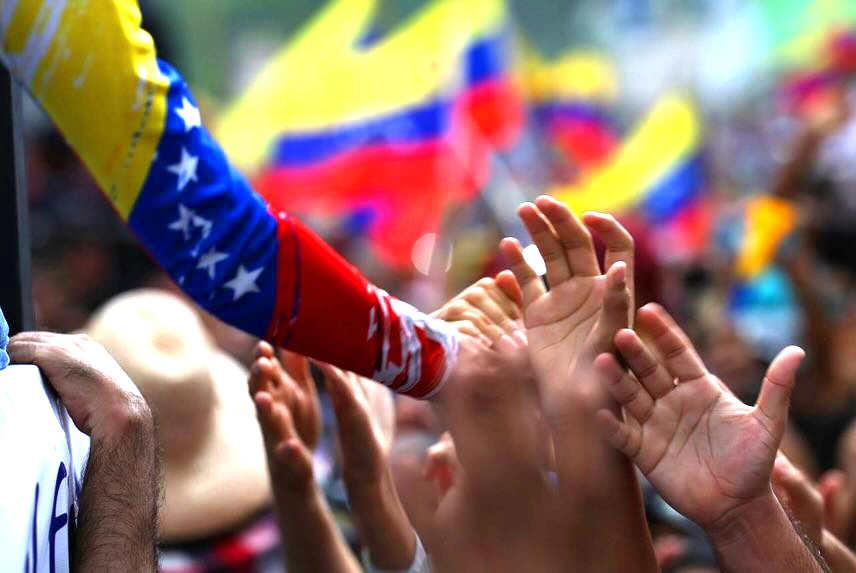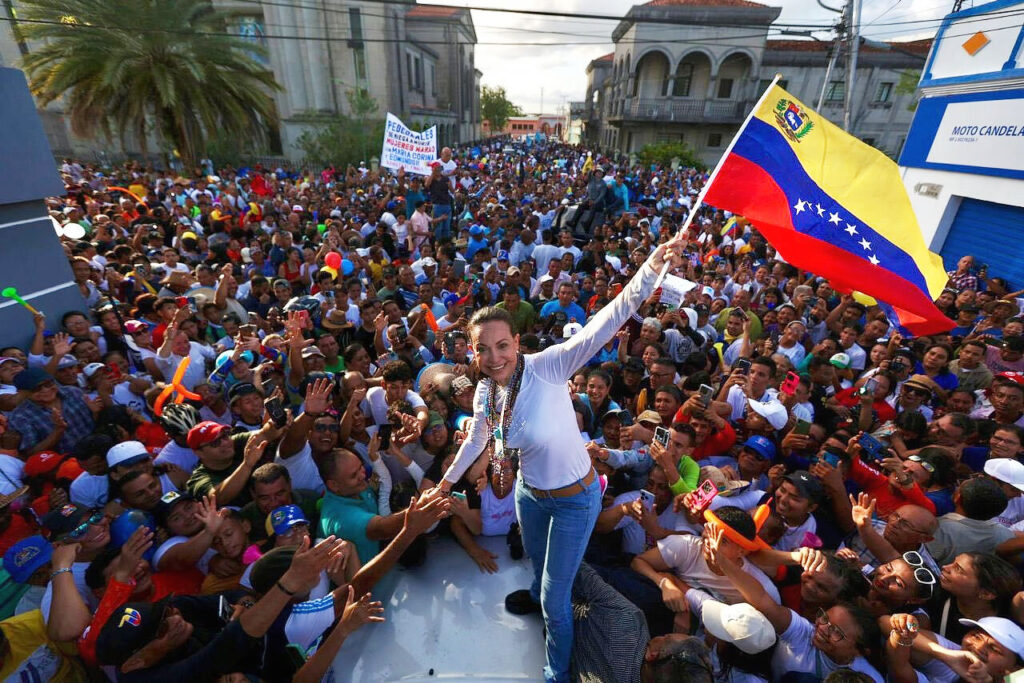The world’s highest peace honor crowns her decades of defiance, even as Maduro’s regime seethes and Venezuela’s long collapse shadows the celebration.
3 Narratives News | October 10, 2025 (Revised December 10, 2025)
Today, on December 10, 2025—exactly two months after this article was written—Machado’s daughter, Ana, accepted the Nobel Peace Prize on her behalf, using the platform to slam the Maduro regime.
“Oh my God… I have no words.”
— María Corina Machado, upon learning she’d been awarded the Nobel Peace Prize.
“I still hear my father’s voice when news like this breaks.” He — Carlos A. Taylhardat — served Venezuela for fifty years, first as a Naval Captain and later as a diplomat to countries around the world. Wherever his spirit is, news like this would have lit him up. Today, the Nobel Committee placed a bright circle around that wound by naming María Corina Machado the 2025 Peace Laureate. The world hears Nobel. I hear courage.
Why the Nobel matters — and why now
The Norwegian Nobel Committee said it chose Machado “for her tireless work promoting democratic rights for the people of Venezuela and for her struggle to achieve a just and peaceful transition from dictatorship to democracy.” Its chair praised her as “an extraordinary example of civilian courage,” adding that the award sends a message to President Nicolás Maduro — and to anyone who believes democracy can still be rebuilt from within tyranny. (Nobel press release)
Machado was barred from the 2024 ballot despite winning the opposition primary. Undeterred, she backed a substitute candidate — Edmundo González — and campaigned at his side. Volunteers photographed vote tallies at polling stations across the country; the opposition maintains those tallies showed González the true victor. As arrests spread and González fled into exile, Machado disappeared into safe houses. (AP; Washington Post)
When Oslo called, she dedicated the prize to the Venezuelan people, later thanking Donald Trump for what she called his decisive support. Her voice trembled between disbelief and resolve. (Nobel interview; Reuters)
María Corina Machado, the Activist
Her public life began with children. In 1992, Machado founded Fundación Atenea to support Caracas street children and later co-founded Súmate, an organization training citizens to safeguard elections. She won a seat in the National Assembly in 2010 and went on to found Vente Venezuela, a movement that helped unify a fractured opposition. International recognition followed, including the European Parliament’s Sakharov Prize in 2024.

Why Oslo chose her: in the committee’s view, democracy is the scaffolding of peace. Free expression, real voting, and representation are the foundations that keep nations from breaking. Machado’s record — citizen observers, transparent counts, and nonviolent mobilization — embodied that vision. (Nobel facts)
“This prize belongs to Venezuelans who resisted peacefully.” — María Corina Machado
María Corina Machado, the Rebel
Inside the regime’s vocabulary, she is a golpista, a traitor, a woman “possessed by imperial forces.” To her supporters, she is the first Venezuelan in a generation who dared to say out loud what others whispered: Maduro’s elections are theater; the ballots are real only when counted by citizens themselves.
When she won the 2023 opposition primary with more than 90% of the vote, the National Electoral Council promptly disqualified her from holding office, citing “administrative irregularities.” The real reason, many observers say, was simpler: she had become impossible to control. The government’s propaganda machine shifted into overdrive, framing her as the face of a “foreign-backed coup.”

Following the disputed 2024 election — where González claimed victory through publicly posted tallies — the crackdown began. Soldiers raided homes in the night; dozens of campaign volunteers were detained. The operation’s code name, “Tun-Tun,” evoked the knock that preceded disappearances in the region’s darkest years.
Machado narrowly escaped capture several times. Witnesses recall her leaving safe houses minutes before raids. She now travels incognito — swapping cars, covering her face, sometimes crossing checkpoints by motorcycle. In videos filmed on borrowed phones, she still declares: “Venezuela decided. Venezuela is free.”
“No one will negotiate Venezuela’s freedom for my freedom,” she told a crowd outside Caracas before going underground again. “This is not about me. This is about a nation that refuses to kneel.”
Her defiance has become a quiet anthem. International watchdogs, including the European Union and the Inter-American Commission on Human Rights, describe the campaign against her as “gendered persecution,” an effort not just to break a politician, but to humiliate a woman who leads.
Abroad, she is a thorn in Maduro’s diplomacy. She calls for sanctions on regime elites; he calls her a puppet of Washington. Strongman Diosdado Cabello mocked her Nobel as “a Yankee trophy for betrayal.” State television sneered that “the empire rewards its agents.” Maduro himself has kept a calculated silence. His ministers fill it with threats: “That woman will never govern this country,” warned Communications Minister Freddy Ñáñez, repeating the insult Chávez once used against her.
And yet, every time she appears — frail from hiding, her voice trembling but unbroken — thousands flood the streets. For a regime built on fear, visibility has become the most subversive act of all.
Her rebellion isn’t about weapons; it’s about will. When they erase her name from the ballot, she writes it back in ink and memory. When they silence her voice, she multiplies through encrypted chats and whispers. When they call her traitor, she answers softly: “I am Venezuela’s daughter.”
The Country That Pushed Its People Out
Under Hugo Chávez (1999–2013) and Nicolás Maduro (2013– ), a nation once buoyed by oil riches drifted into ruin. Printing presses replaced policy; slogans replaced bread. Prices climbed so fast that people stopped counting zeros. The IMF calls Venezuela’s collapse one of the worst peacetime contractions in modern history — yet numbers cannot measure hunger or humiliation.
Bit by bit, democracy’s fabric tore. Freedom House reports that the regime “closed off virtually all channels for dissent,” turning elections into spectacle and jailing those who refused to applaud. After the disputed 2024 vote, human-rights groups recorded hundreds of arrests — students, mayors, even mothers who dared to march.
When the lights went out, people walked. Nearly 7.9 million Venezuelans have now left their homeland — the largest exodus in modern Latin America. The R4V platform counts 6.87 million across the region alone. They fled on foot over the Andes, on rafts toward Trinidad, on buses that never returned. They carried photographs, passports, and sometimes only their children’s names.
This is the landscape behind Machado’s Nobel — a homeland that bleeds through every border crossing. For her, exile isn’t an idea; it’s the echo of footsteps in safe houses, the fear of a knock at midnight. For me, it’s my father’s silence in his final year, watching the flag he saluted become a warning sign.
Machado refuses to leave. She stays hidden, thin but unyielding. Months ago, she looked malnourished and exhausted, yet kept sending messages and asking for prayers. Recently her energy has returned, as if some quiet plan — unseen but certain — is unfolding toward victory. The Nobel Committee, perhaps unknowingly, honored someone still in the middle of her journey.
“They tried to erase us,” she once said. “But Venezuela is not a government. Venezuela is its people.”
So when Oslo spoke her name, millions heard their own. A mother wiring pesos from Bogotá, a son repairing phones in Santiago, a captain long gone but still saluting from memory — all became part of her victory. The prize is not peace achieved, but peace promised: a reminder that a nation is never lost while even one of its children refuses to disappear.
Key Takeaways
- Why she won: nonviolent democratic mobilization and “civilian courage” toward a peaceful transition.
- Her words: she dedicated the prize to Venezuelans and thanked Trump for his “decisive support.”
- Maduro’s line: no detailed statement widely carried at press time; regime voices typically call her a conspirator and decry outside pressure.
- The crisis beneath: misrule and repression drove hyperinflation, economic collapse, and the displacement of nearly 7.9 million people.
FAQs
Why did the Nobel Committee choose Machado? Because she embodied a nonviolent, citizen-led movement for genuine elections and a peaceful transition. What has Machado said about winning? She dedicated the award to Venezuelans, thanked Trump for “decisive support,” and showed visible emotion during the call. What has Nicolás Maduro said? No detailed, official statement was widely reported as of publication; regime figures have long criticized her as a destabilizing force. How did Venezuela fall so far? Oil dependence, money printing, controls, and institutional capture led to hyperinflation and collapse. How large is the refugee crisis? Nearly 7.9 million Venezuelans have left the country, about 6.87 million of whom are within Latin America and the Caribbean.
Related at 3 Narratives: See our editorial recipe on how we tell two sides and reveal a silent story, and explore more coverage under World.


